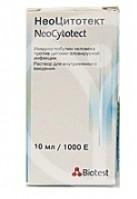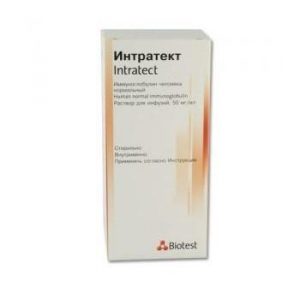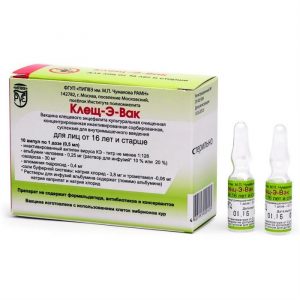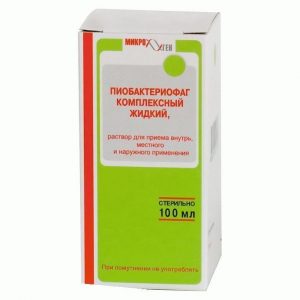Description
Packing
10 ml – bottles (1) – packs of cardboard.
Pharmacological action
NeoCitotect is an immunoglobulin preparation made from donor plasma with a high titer of antibodies against the cytomegaly pathogen. The distribution of IgG immunoglobulin subclasses corresponds to the plasma distribution of healthy donors.
Pharmacokinetics
The bioavailability of human immunoglobulin against cytomegalovirus infection with iv administration is 100%.
Distribution between plasma and extravascular fluid occurs fairly quickly, and after 3-5 days, equilibrium between intravascular and extravascular space is achieved. The half-life of NeoCitotect is an average of 24 days.
Immunoglobulin G and IgG complexes are utilized by the cells of the reticuloendothelial system.
Indications
prevention of cytomegalovirus infection in patients with a drug-suppressed immune system, in particular after organ transplantation
prevention of disease manifestation after infection with cytomegalovirus (CMV)
therapy of cytomegalovirus infection in immunocompromised children, for example patients with immunosuppressed medication or immunodeficiency caused by other causes (e.g. AIDS).
Use during pregnancy and lactation
The absence of a risk of using this drug during pregnancy has not been studied in controlled clinical trials, therefore, it should be used with caution during pregnancy and lactation, although long-term experience with the medical use of immunoglobulins does not allow to expect any harmful effect on the course pregnancy, as well as the fetus and newborn.
Introduced immunoglobulins are excreted in human milk and may contribute to the transmission of protective antibodies to newborns.
Composition of
1 ml
plasma proteins 50 mg,
immunoglobulins not less than 75%
immunoglobulin A not more than 2.5 mg
human immunoglobulin against cytomegalovirus 100 IU *
Excipients: srdlk gldcp and srdlk.
Dosage and Administration
Dosage and Administration
Prior to administration of NeoCitotect, a visual check is required. The solution should be transparent or slightly opalescent. An opaque or precipitated solution is prohibited.
Before administration, the drug must be warmed to room temperature. NeoCitotect is intended for intravenous infusion.
The initial infusion rate should be 0.08 ml / kg body weight / h, after 10 minutes with good tolerance to the drug, the speed can be gradually increased to a maximum of 0.8 ml / kg body weight / h and keep it until the end of administration.
The drug is not subject to preliminary dilution.
NeoCiotect should not be mixed with other drugs.
An open vial should be used immediately. Due to the risk of bacterial contamination, unused solution must be discarded.
The following dosages are recommended when using NeoCitotect:
Prevention of cytomegalovirus infection in immunocompromised patients
The drug is administered in a single dose of 1 ml per kg of body weight. In CMV-seronegative patients, organ transplantation should begin on the day of transplantation, and in bone marrow transplantation, on the day before transplantation. In CMV-seropositive patients, prophylaxis should be started 10 days before transplantation. The patient should receive at least 6 single doses with an interval of 2-3 weeks.
Therapy for cytomegalovirus infection
A single dose of 1 ml per kg of body weight every 48 hours until the clinical symptoms disappear.
Side effects
With the introduction of NeoCitotect, side effects such as chills, headache, fever, nausea, vomiting, lowering blood pressure, allergic reactions, aching joints and mild back pain are possible. In rare cases, as a result of the introduction of immunoglobulin, a sharp decrease in blood pressure is possible and, in isolated cases, anaphylactic shock, even if the patient did not show hypersensitivity during the previous administration of the drug.
With the introduction of normal human immunoglobulin, there were cases of signs of aseptic meningitis and, in rare cases, hemolytic anemia / hemolysis, transient skin reaction (rash or hyperemia), which completely disappeared after discontinuation of therapy.
In addition, there has been an increase in serum creatinine and / or acute renal failure.
Isolated cases of thromboembolic reactions, such as myocardial infarction, stroke, pulmonary embolism and venous thrombosis, have been reported.
In the event of reactions that indicate intolerance to the drug, you must either reduce the rate of administration or suspend the infusion until the symptoms disappear. The choice of appropriate measures to prevent the occurrence of side effects depends on the type and severity of the side effect.
In case of adverse effects on renal function, the decision to discontinue immunoglobulin therapy should be weighed.
In case of shock, follow current guidelines for anti-shock therapy.
Use in case of impaired renal function
Use with caution in case of impaired renal function.
Use in elderly patients
Use with caution in patients over 65 years of age.
Drug Interaction
Live Viral Vaccines: Immunoglobulin administration can adversely affect live vaccines against viral diseases such as measles, rubella, mumps and chickenpox.
Vaccination with these drugs should be performed no earlier than 3 months after NeoCitotekt. In the case of measles vaccination, this interval can be increased up to 1 year. In this regard, patients receiving NeoCitotect who need to be vaccinated against measles should first be screened for specific antibodies against the measles.
Laboratory tests: after the introduction of immunoglobulin, a temporary increase in the titer of various passively administered antibodies is possible, which can lead to false positive results in serological testing. Passively introduced antibodies against erythrocyte antigens (eg, A, B, D) may affect individual serological parameters such as alloantibodies to erythrocytes (eg Coombs reaction), reticulocyte count and haptoglobin.
Overdose
Overdose of the drug in patients at risk, especially in the elderly, as well as in patients with impaired renal function, can lead to increased blood viscosity.
Storage conditions
Store in a dark place at a temperature of 2 ° to 8 ° C, do not freeze!
Keep out of the reach of children.
Shelf suitability
3 Year
Deystvuyuschee substances
immunoglobulin chelovecheskyy antytsytomehalovyrusn y
dosage form
dosage form
infusion solution




